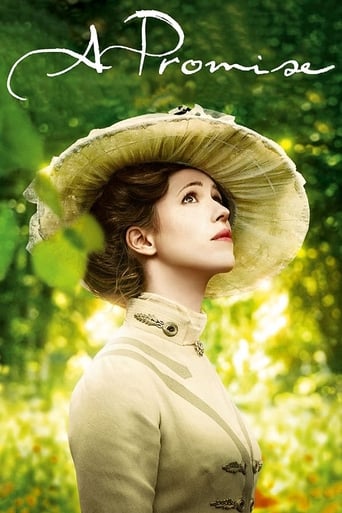adam-703-808689
It looks pretty and, very slowly, seems to be building towards something, but almost nothing of a dramatically satisfying/unpredictable/entertaining nature happens. It has the appearance of a vanity project. Someone's grandparent had an interesting life, so their story was turned into a film, but someone forgot to include enough drama/characterisation/plot to keep an audience awake . A bright young man (played by a very dull actor) is employed by an older man, an industrial magnate. The young man is attracted to the magnate's wife ( a very dull actress) and vice-versa. The young man goes to Mexico, on business, and promises to return within 2 years. The magnate dies. The young man doesn't return from Mexico. Eventually he does. He and the magnate's wife can now be together. Nothing much else happens. The End.
Ecology Fan
It's no wonder that the film's budget was nearly $11 million. "A Promise" is truly gorgeously shot.It's equally no surprise that the US box-office take was less than $1 million. I don't know at whose feet to lay the blame for this soporific set-piece: casting? direction? I do know that this is a love story without much in the way of romantic feeling. Perhaps a boy-meets-girl, boy-gets-girl plot is way too predictable these days, but there was so little spark, particularly from the younger of the two male leads, that I did not even root for the typical outcome.It was clever, I suppose, to substitute "British" class-based accents for a story set in Germany to distinguish characters' social classes from one another. (How would the average viewer know a higher-class German-accented English versus a lower-class one?) And there were certainly other competent directorial decisions. There may have also been an anachronism or two, however, including a clunky scene near the end alluding to the rise of Nazism, but the timing wasn't completely clear (right after the war? early 1920s?), so I'll give M. Leconte a pass on that.May the great Alan Rickman, a highlight of this production, rest in peace.
Irie212
We are in Germany before World War I. Karl Hoffmeister (Alan Rickman) is the aging and ailing husband of young Lotte (Rebecca Hall). He is also an industrial magnate in need of a successor. Enter Friedrich (Richard Madden), a metallurgist with a head for business. He is soon welcomed not only into the industry but into their home. What follows is 90 minutes of Lotte and Friedrich stealing looks at each other, and Karl catching them at it-- at looking, that is, because that is just about the full extent of their indiscretion.The War is the catalyst which sends Friedrich overseas to mine magnesium. Karl remains at home, dying, and Lotte watches. There's a lot of watching in this movie, and not a lot of plot. You would not miss much if you kept your thumb on fast-forward.The problem with love stories is that they require chemistry between the lovers. There is no chemistry here. Literally, none. Rebecca Hall plays Lotte with an abundance of poise and dignity, and no small amount of charm. She's the animated one. Richard Madden, on the other hand, has a handsome but empty face. He wears his one blank expression throughout the movie. Except for the rare instances when he laughs, he is blank-- as blank when he's talking about war profiteering as he is blank when his crotch is being fondled by his high-spirited and adorable mistress (Shannon Tarbet), who calls him Fritz and disappears from the film early. Whatever feelings of desire come through are generated by the audience-- for me, that was a desire for the two of them to get on with things, or for the movie to end.The key scene-- the one with actual insight into the emotional landscape adults muddle through --is effective, however, because it captures how very strange estrangement is when, with passing time, it displaces love. When Friedrich returns from overseas, after a decade, he and Lotte have become virtual strangers. The war has interrupted even their correspondence. They must take for granted, somehow, that they were once devoted to each other, if they are to live happily ever after. It is a worthy scene, but the scenes that come before, and even after, are too long in the telling, with too little told, and too little feeling touching the heart.
diisdesigns10
I watched this film and was anxious to see a period piece set in Germany pre WWI but it never quite got off the ground. There is no chemistry between the two lovers. The male lead is not somebody a wife would fall in love with even if he is there all the time. He had no personality. He does not make her laugh, is not all that great with the son and offers no sex appeal. Rickman offers the only acting spark. It would have been interesting to see more of what Germany was like leading up, during and after the defeat of the war. Would make for such wonderful material both in plot and theme. A feeble attempt was made to stir up the politico in a scene close to the end where there is an aggressive street demonstration with people wearing swastikas. The Nazi party did not come into existence at the time the film depicts (end of war 1918). The DAP which was the predecessor of the Nazi party came into being in 1919 but it was not known enough for a street demonstration in 1918 and not with Nazi swastikas. These are simple facts I found online. I would not have researched had there not been that street demonstration scene with swastikas. It was totally out of place for the rest of the film. There should have been more of these types of scenes as there were riots in Germany in 1916 because of shortages in fuel and food. The film totally missed the effects the war had on the German people. The kiss at the end was as passionless as the whole lifeless movie.




